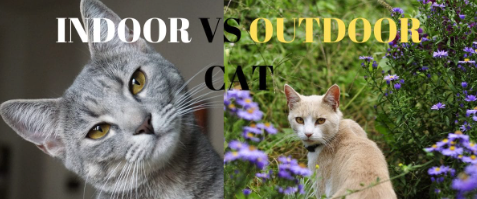
The decision between having an indoor cat or an outdoor cat depends on various factors and considerations.
PROS OF INDOOR CATS:
- Safety: Indoor cats are protected from potential dangers such as traffic accidents, exposure to diseases, attacks by other animals, and getting lost.
- Longevity: Indoor cats generally have longer lifespans compared to outdoor cats due to reduced exposure to hazards and risks.
- Health: Indoor cats are less likely to encounter parasites, suffer from injuries, or contract certain diseases prevalent among outdoor cats.
- Environmental Impact: Indoor cats have a reduced impact on local wildlife, as they do not contribute to predation on birds and other small animals.
CONS OF INDOOR CATS:
- Exercise and Stimulation: Indoor cats may have limited opportunities for physical exercise and mental stimulation. Owners need to provide them with regular playtime, interactive toys, scratching posts, and climbing structures.
- Boredom and Restlessness: Lack of outdoor exploration can sometimes lead to boredom or restlessness in indoor cats. Environmental enrichment, including puzzle toys and window perches, can help alleviate this.
- Limited Natural Behaviors: Indoor cats may have limited access to natural behaviors like hunting, climbing trees, and basking in the sun.
PROS OF OUTDOOR CATS:
- Enrichment and Natural Behaviors: Outdoor cats have the opportunity to engage in natural behaviors, such as hunting, climbing, and exploring their surroundings.
- Exercise and Stimulation: Outdoor cats have more space to roam, which allows for increased exercise and mental stimulation.
- Independence: Outdoor cats can satisfy their curiosity and enjoy a sense of freedom and independence.
CONS OF OUTDOOR CATS:
- Safety Risks: Outdoor cats face a range of dangers, including traffic accidents, encounters with aggressive animals, exposure to diseases, and the risk of getting lost or stolen.
- Shorter Lifespan: Outdoor cats, on average, have shorter lifespans due to the increased risks and hazards they encounter.
- Wildlife Impact: Outdoor cats can contribute to the predation of birds, small mammals, and other wildlife, which can have ecological consequences in certain areas.
- Veterinary Care: Outdoor cats may require more frequent veterinary care due to increased exposure to parasites, injuries, and diseases.
It's important to note that some cat owners choose a compromise by providing a safe and supervised outdoor experience for their cats, such as enclosed outdoor enclosures or "catios," which offer a controlled outdoor environment while minimizing risks.
Ultimately, the decision between indoor and outdoor cats should be based on the cat's individual needs, the environment in which you live, and the measures you can take to ensure their safety, well-being, and enrichment.



0 comments